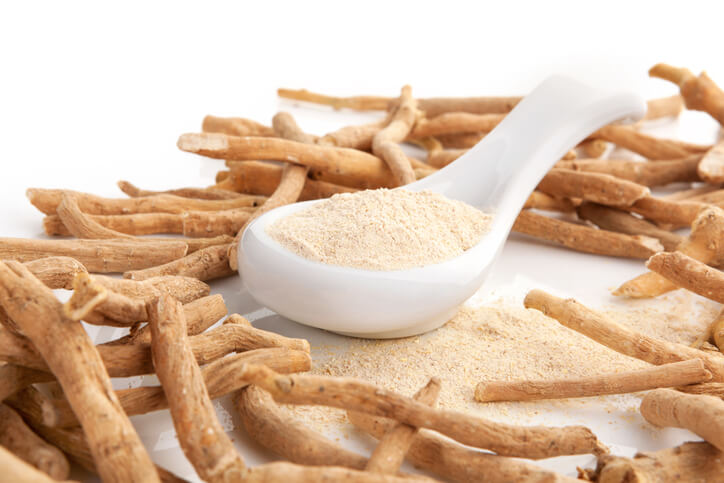In stressful times, our nervous system is most prone to weakness. One of the seven tissue systems in Ayurveda is the central nervous system. Ayurvedic herbs have the ability to specifically target tissue systems and doshas to heal imbalances.
What is Ashwagandha?
One of the main Ayurvedic tonics for the nervous system is ashwagandha. It is known in Western herbology as Winter Cherry or Indian Ginseng; its Latin name is Withania somnifera. The word "somnifera" is a cognate of the word somniferous, which indicates that it is sleep promoting. It is a flowering plant that is typically found in India and Africa. It falls within the nightshade family.
Ashwagandha is pronounced:
Ush-Vuh-Gun-Dha
- Ush (as in usher)
- Vuh (rhymes with huh)
- Gun
- Dha (pronounced like the)
Literally, the word ashwagandha translates as "smell of a horse". It's said to give the stamina of a horse and also work on the male reproductive tissue. Horses are known for being vigorous, active animals.
Ashwagandha is one of the main tonics used in Ayurveda to pacify Vata dosha. Ashwagandha has a heating action on the body and a sweet after taste. (Learn more in The 3 Doshas of Ayurveda.)
The Benefits of Ashwagandha
Some of the health benefits of ashwagandha inlcude:
- It's a nervine tonic, which is both calming and energizing.
- It is an adaptogen, which helps restore homeostasis to the body.
- It decreases Vata and Kapha doshas, but may increase Pitta when taken in excess.
- It increases the body's ability to combat stress.
- It helps increase energy to give you increased stamina.
- It is a rejuvenative tonic or rasayana.
- At night, ashwagandha promotes restful sleep.
- It helps nourish the muscle and bone tissues.
- It is said to have aphrodisiac qualities for both men and women.
- This nerve tonic helps with memory loss, exhaustion and ADHD.
- It helps regulate thyroid function
- It can aid with regulating adrenal fatigue.
Both children and seniors can benefit from ashwagandha, as it has been used to aid weak tissues, emaciation, and to provide adrenal support. It has an anabolic or building effect.
Historically, ashwagandha has been used for a range of health issues from paralysis to infertility. People with respiratory issues such as allergies, hay fever, and cough may also benefit from the use of ashwagandha.
Topically, ashwagandha is found in Ayurvedic oils and herbal preparations. It can be used for nervous system disorders.(Learn more in Ayurveda's Five-Step Self-Care Routine for Spring.)
How to use Ashwagandha
As a powder:
- Traditionally, ashwagandha root is dried and then taken in powder form.
- To get the most direct action, place the powder directly on your tongue. Then swallow with warm water or milk. You can start by taking ¼ tsp.
- To help induce sleep, take ¼ tsp of ashwagandha powder in warm milk heated on a stove top.
- You can take ashwagandha powder mixed with equal parts ghee and raw honey. Organic ghee and honey are two of the best carriers of nutrients in Ayurveda.
A skilled Ayurvedic practitioner will also know the synergistic effect of combining ashwagandha with other herbs to best enhance your healing. (Learn more in 5 Ayurvedic Recipes to Stoke Your Inner Fire.)

As a tablet:
- It is better to take pressed pills rather than capsules so that you get the taste on your tongue.
- Tablets should draftlly be chewed for more effective action.
As a tincture:
- Tinctures or liquid supplements have a quick pathway into the bloodstream.
- Tinctures can be taken directly or diluted in warm water.
- Follow the directions on the bottle.
- Start with a low dose and then work your way up to the dosage stated on the bottle.
As a body oil:
- Ayurveda uses oils topically to promote circulation and aid healing in the tissues.
- Take a handful of oil which contains ashwagandha and apply over body parts which need attention, such as your joints. You can also do a full body massage.
- Vata massage oils usually have ashwagandha. Let the oil sit for at least half an hour and then take a warm shower. The warm water will allow the oil to penetrate into the deeper tissues.
- Be careful of slippage in the shower or bath, so please use a bath mat.
Who Shouldn't Take Ashwagandha?
There are some precautions to be followed when taking ashwagandha.
People with a great deal of ama or toxicity, as well as chronic congestion should wait to use ashwagandha until consulting their health care practitioner. One way to tell if you have if you have a lot of toxicity is to see if you have a heavy coating on your tongue in the morning. If you have a chronic illness, then that is another sign of toxins circulating in your body. Thus, ashwagandha would not be recommended.
Pregnant women should also avoid ashwagandha. People with high Pitta, as well as hypoglycemics should use ashwagandha very cautiously.
Before beginning any health care regimen, it is helpful to consult your primary health care practitioner. An Ayurvedic consultation is also helpful in keeping you on the path to health. (Learn more in Ayurveda's Top 5 Medicinal Plants for Restoring Balance to the Body.)
During These Times of Stress and Uncertainty Your Doshas May Be Unbalanced.
To help you bring attention to your doshas and to identify what your predominant dosha is, we created the following quiz.
Try not to stress over every question, but simply answer based off your intuition. After all, you know yourself better than anyone else.